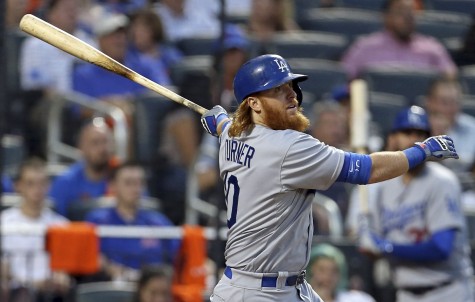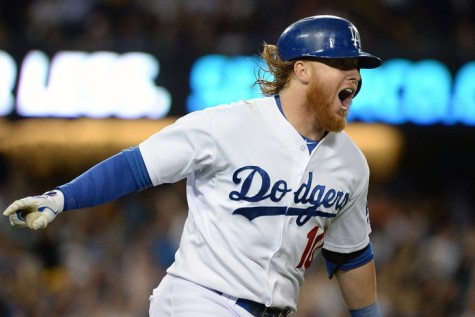
Of all the mistakes Sandy Alderson has made as Mets GM, none look more egregious than the non-tendering of Justin Turner. In fact, letting go of Turner looks like one of the all-time bad moves in Mets history.
Friday night, even more salt was thrown into the wound. The infielder clubbed a three-run homer off Taijuan Walker in Game 1 of the NLDS to help propel Los Angeles to victory. In a playoff run consisting of players of the Mets past, Turner’s high level of play perhaps stings the most.
Unlike some of the Mets’ prior mistakes that made sense at the time, this one was a head scratcher from the get-go. Turner, who could play all four infield positions, had batted a respectable .267/.327/.371 in 295 games from 2011-13.
That’s far from elite, but you could definitely do a lot worse than that. It would have been one thing to trade Turner, but to let him walk for nothing in return was completely and utterly absurd.
Even more puzzling was the Mets rationale for the non-tender. Alderson and crew reportedly cut Turner over a perceived lack of hustle, despite the fact that there were no reports about Turner’s “lack of hustle” in the media prior to the non-tender, nor were there any publicly apparent instances of this. Even then-SNY reporter Kevin Burkhardt expressed shock at the “lack of hustle” reports.
I’ll say this about report on Mets releasing Justin Turner. He didn’t hustle? Show me the game. Never saw it or heard it while he was here.
— Kevin Burkhardt (@kevinburkhardt) Dec. 10, 2013
Even before Turner became an All-Star, this move was questionable. And this lack of rationale is precisely what makes this Alderson’s worst move. During other bad moves, Alderson at least had a motive that was defensible at the time:
When he didn’t re-sign Daniel Murphy, he had Neil Walker to play second base. When he traded Collin McHugh for Eric Young, he at least thought they were getting a solid speedster in return. And when he signed David Wright to a long-term deal, he couldn’t have possibly foreseen Wright’s body breaking down at 32.

In the case of Turner, however, there was nothing to be gained from releasing him at all; not at the time, and certainly not after the fact. He made just $1 million in 2014, which is a reasonable price for a utility player coming off of a .280/.319/.385 season. Why someone like that would even be a non-tender candidate defies logic, even considering the Mets’ frugal ways.
Of course, nobody could have predicted that Turner would turn into a star. He’s batted .303/.378/.502 since leaving the Mets. And given the Mets’ track record, there’s a good chance he wouldn’t have done that had he stayed in Flushing.
But he was still a solid utility infielder with a low-ish price tag, making him well worth the $1 million salary. Even if Turner had not become a star and remained a solid utility player, releasing him would have still been a bad move.
















